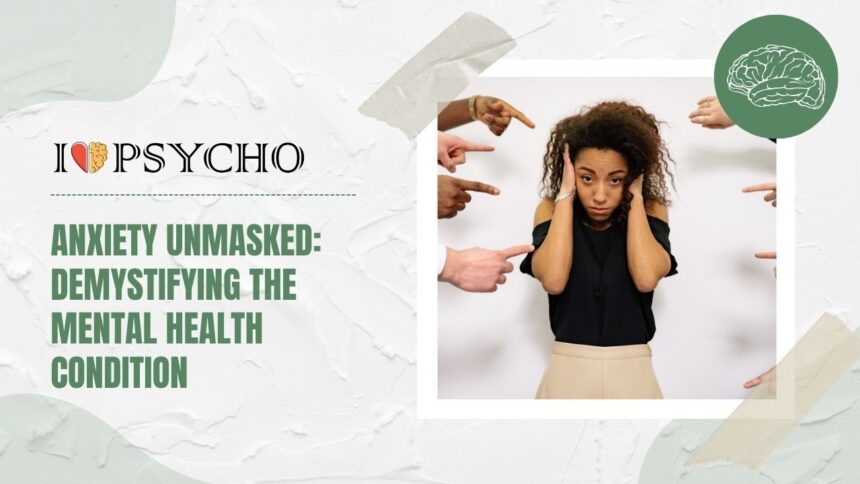Welcome to the unmasking of anxiety – a complex and often misunderstood mental health condition that affects millions worldwide. From its subtle whispers to overwhelming waves, anxiety can manifest in various forms, impacting individuals both mentally and physically. Join us as we delve into the depths of this prevalent yet enigmatic issue, shedding light on what it truly means to live with anxiety. Let’s embark on a journey towards understanding, acceptance, and ultimately, empowerment in navigating life with anxiety by our side.
Defining Anxiety: What is it and what are the common symptoms?
Anxiety is more than just feeling nervous or stressed; it’s a complex emotional state that can have profound effects on one’s daily life. It goes beyond temporary worries and can become chronic, impacting how individuals think, feel, and behave.
Common symptoms of anxiety include persistent feelings of fear or dread, restlessness, difficulty concentrating, irritability, muscle tension, and trouble sleeping. Physical manifestations such as rapid heartbeat, sweating, trembling, and even panic attacks are also prevalent among those with anxiety.
It’s crucial to recognize these signs early on to seek appropriate help and support. Understanding the nuances of anxiety can empower individuals to better manage their symptoms and improve their quality of life.
Types of Anxiety Disorders
Anxiety disorders come in various forms, each with its own set of symptoms and challenges. Generalized Anxiety Disorder (GAD) is characterized by excessive worry about everyday things, often accompanied by physical symptoms like restlessness and fatigue.
Social Anxiety Disorder involves an intense fear of social situations, leading to avoidance of interactions that can cause significant distress. Panic Disorder manifests as sudden and recurring panic attacks, which can be debilitating and overwhelming for those experiencing them.
Phobias are another common type of anxiety disorder, involving irrational fears of specific objects or situations. Obsessive-Compulsive Disorder (OCD) presents with intrusive thoughts and compulsive behaviors aimed at reducing anxiety but can disrupt daily life.
Post-Traumatic Stress Disorder (PTSD) develops after a traumatic event and can lead to flashbacks, nightmares, and hypervigilance. Understanding the different types of anxiety disorders is crucial in seeking appropriate treatment tailored to individual needs.
Myths vs. Facts about Anxiety
Anxiety is often misunderstood, leading to various myths that can contribute to the stigma surrounding mental health conditions. One common myth is that anxiety is just being overly nervous or stressed out, but in reality, it goes beyond temporary feelings of worry.
Another misconception is that people with anxiety can simply “snap out of it” or control their symptoms if they try hard enough. However, anxiety disorders are complex and require professional help for effective management.
It’s also important to debunk the idea that only certain types of people experience anxiety. In truth, anxiety can affect anyone regardless of age, gender, or background.
On the flip side, a crucial fact to understand is that anxiety disorders are real medical conditions with biological and psychological components. Seeking treatment from healthcare providers trained in mental health care can make a significant difference in managing symptoms effectively.
By distinguishing between myths and facts about anxiety, we can work towards creating a more empathetic and supportive environment for individuals navigating this challenging condition every day.
Causes of Anxiety: Nature vs. Nurture
Anxiety, a complex mental health condition, can stem from various factors. Some believe that genetics and biological predispositions play a significant role in the development of anxiety disorders. Research suggests that individuals with a family history of anxiety may be more prone to experiencing it themselves.
On the other hand, environmental influences also contribute to the manifestation of anxiety. Childhood experiences, traumatic events, high-stress environments, and learned behaviors all play a part in shaping an individual’s susceptibility to anxiety.
The interplay between nature and nurture is intricate when it comes to understanding the causes of anxiety. While some people may have a genetic predisposition towards anxiety, environmental factors can trigger or exacerbate these tendencies.
It’s essential to recognize that both nature and nurture interact in shaping our mental health outcomes. By acknowledging these influences, we can better understand how anxiety develops and tailor effective treatment approaches for individuals struggling with this condition.
Coping Strategies for Managing Anxiety
When it comes to managing anxiety, finding coping strategies that work for you is essential. One effective method is practicing mindfulness and deep breathing exercises to help calm the mind and body during moments of heightened anxiety. Engaging in regular physical activity can also be beneficial in reducing stress levels and improving overall mental well-being.
Another useful strategy is maintaining a healthy lifestyle by eating nutritious foods, getting enough sleep, and avoiding excessive alcohol or caffeine intake. Establishing a consistent routine can provide a sense of structure and stability, which can help alleviate feelings of uncertainty or overwhelm.
Additionally, connecting with supportive friends or family members can offer comfort and understanding during challenging times. Exploring hobbies or activities that bring joy and relaxation can serve as a positive distraction from anxious thoughts.
Remember, managing anxiety is an ongoing process that may require trial and error to find what works best for you. Don’t be afraid to seek professional help if needed to develop personalized coping strategies tailored to your unique situation.
Seeking Help: Therapy, Medication, and Other Treatment Options
Seeking help for anxiety is a courageous step towards better mental health. Therapy can provide a safe space to explore your thoughts and feelings, helping you develop coping strategies. Cognitive-behavioral therapy (CBT) is particularly effective in treating anxiety by challenging negative thought patterns.
Medication may also be an option, such as anti-anxiety medications or antidepressants prescribed by a healthcare professional. It’s essential to work closely with your doctor to find the right medication and dosage that works for you.
In addition to therapy and medication, other treatment options like mindfulness practices, exercise, and relaxation techniques can complement traditional treatments. Finding what works best for you may involve some trial and error but don’t give up.
Remember, seeking help is not a sign of weakness; it’s a proactive step towards taking care of yourself and living a more fulfilling life despite anxiety.
Overcoming the Stigma Surrounding Mental Health Conditions
The stigma surrounding mental health conditions can be daunting, making it challenging for individuals to seek help and support. Society’s misconceptions often lead to feelings of shame and isolation for those struggling with anxiety or other disorders.
It’s essential to educate ourselves and others about the realities of mental health. By engaging in open conversations and sharing personal experiences, we can break down barriers and create a more understanding environment.
Supporting loved ones with compassion and empathy is crucial in overcoming the stigma. By offering a listening ear without judgment, we can make a significant impact on someone’s journey towards healing.
Challenging stereotypes and advocating for mental health awareness helps shift societal perspectives. Everyone deserves to feel accepted and supported regardless of their struggles.
Together, we can work towards creating a world where individuals feel empowered to prioritize their mental well-being without fear of judgment or discrimination.
Conclusion: Living a fulfilling life with Anxiety
Living a fulfilling life with anxiety is possible. By understanding the condition, recognizing its symptoms, and seeking help when needed, individuals can effectively manage their anxiety. It’s crucial to debunk myths surrounding anxiety and educate ourselves on the facts. Whether through therapy, medication, or other treatment options, there are ways to cope with anxiety and lead a fulfilling life.
It’s important to remember that mental health conditions should not carry stigma. Seeking support from loved ones and professionals can make a significant difference in managing anxiety. With the right tools and resources, individuals can navigate their challenges and thrive despite living with anxiety.
Embracing self-care practices, engaging in activities that bring joy, and practicing mindfulness are all valuable strategies for maintaining mental well-being. Remember, you are not alone in this journey – there is help available for those who seek it.
By prioritizing your mental health and taking proactive steps towards managing your anxiety, you can live a fulfilling life where anxiety does not define you but becomes a part of your story that makes you stronger.









